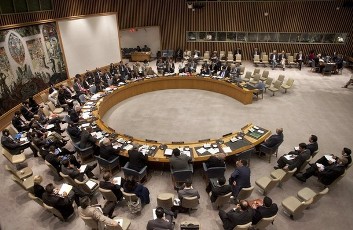UNSC headed for a vote on resolution endorsing AU roadmap for north & south Sudan
May 1, 2012 (WASHINGTON) – The United Nations Security Council (UNSC) appears headed for a vote on a U.S. draft resolution that requires Khartoum and Juba to return to the negotiating table or face non-military measures under article 41 of the UN charter.

Armies of the neighboring nations clashed last month in the oil-rich Heglig region after South Sudan’s army managed to occupy it for ten days. Sudan’s army managed to take it back though Juba insists it withdrew voluntarily.
This was the worst fighting between the two sides since South Sudan split from the north to become an independent nation in July 2011.
Many observers believe that the fighting was a direct result of failure by Khartoum and Juba to reach an agreement on several key post-secession issues namely oil, borders, Abyei, citizenship and external debt.
Sudanese president Omer Hassan al-Bashir said last month that his country is no longer interested in talks with the south because the latter only understands the “language of the gun”. However, Bashir’s foreign minister Ali Karti later said they can only sit down for security negotiations.
The AUPSC declaration sets a timeframe for re-launching negotiations and reaching an agreement between north and south Sudan that were all reflected in the proposed UNSC resolution. It also calls for cessation of hostilities, withdrawal of troops from contested regions such as Abyei and ending any backing to rebel groups on the other side of the borders.
Sudan rejected the UNSC intervention in the matter and appeared critical of the AUPSC for involving the council. Officials in Khartoum are concerned that the resolution will pave the way for internationalization of north-south conflict and also the insurgencies in Blue Nile and South Kordofan border states.
Bashir has scrapped an AU-brokered agreement signed by his aide in June 2011 with Sudan People Liberation Movement North (SPLM-N) which is fighting the Sudanese army in those two states. He ordered the army to crush the rebellion and rejected any negotiations with its “outlawed” leaders.
The UNSC will order Khartoum and SPLM-N to cooperate with the mediation efforts.
“[The UNSC] Decides that the Government of Sudan and the SPLM-North shall extend full cooperation to the AUHIP and the Chair of IGAD, to reach a negotiated settlement on the basis of the June 28, 2011 Framework Agreement on Political Partnership between NCP and SPLM-N and Political and Security Arrangements in Blue Nile and Southern Kordofan States”.
It also urges the two sides to “accept the tripartite proposal submitted by the African Union, the United Nations and the League of Arab States, to permit humanitarian access to the affected population in the two areas”.
Failure to compliance with the Chapter VII resolution could prompt the council to consider measures incorporated in article 41 of the UN charter such as economic sanctions.
China and Russia, two of Sudan’s traditional allies at the UNSC, were reluctant to allow for the sanctions threat to be included in the draft resolution but it appears unlikely that they will veto it should the vote proceed as planned on Wednesday.
“They oppose even the mention of Article 41,” one diplomat told AFP.
“This time it is less the Russians and more the Chinese,” another senior Western diplomat told Agence France Presse (AFP) on condition of anonymity.
“If they keep on not liking it, they might abstain. I don’t think they will veto,” the envoy added.
The diplomat noted that since the request came from the AU it may be difficult for either permanent members to block it.
“It is much more difficult for the Chinese and Russians to say no to an AU request than a western plan,” the envoy said.
This week, Sudanese foreign minister met with his Russian counterpart Sergei Lavrov in Moscow seeking a stance against the resolution.
But Lavrov expressed general support to the resolution and even the threat of possible sanctions in the event of non-compliance.
The resolution “says that the Security Council will consider the sides’ actions, and depending on how they implement this resolution, the Council intends to discuss possible further steps,” Lavrov told reporters.
“Yes, it may include measures of economic pressure. But I would repeat that this is not an automatic decision, but only an intention depending on how the resolution is implemented,” he added.
Sudan made a formal preliminary acceptance of the AU roadmap in a letter sent by Karti to AU commission chairman Jean Ping on Sunday.
According to state media, Khartoum nonetheless expressed reservations on unspecified portions of the plan.
(ST)
Al Jazeera English | UN threatens sanctions over Sudan dispute | 2 May 2012
